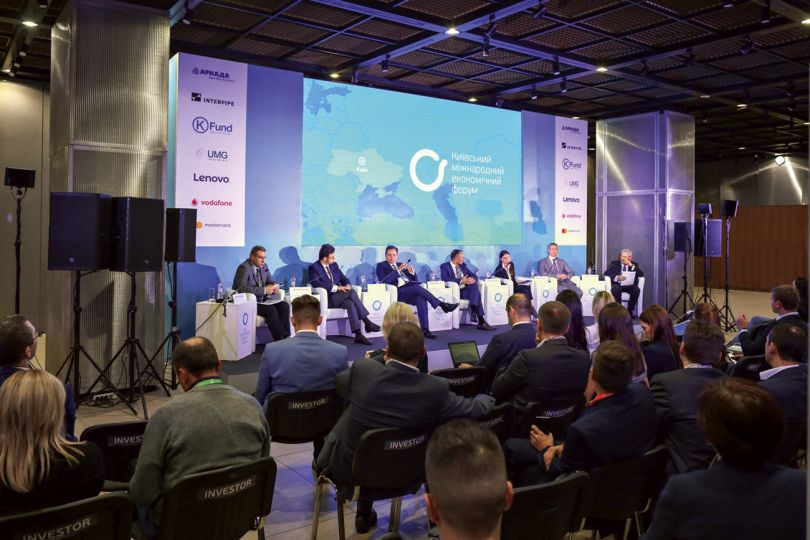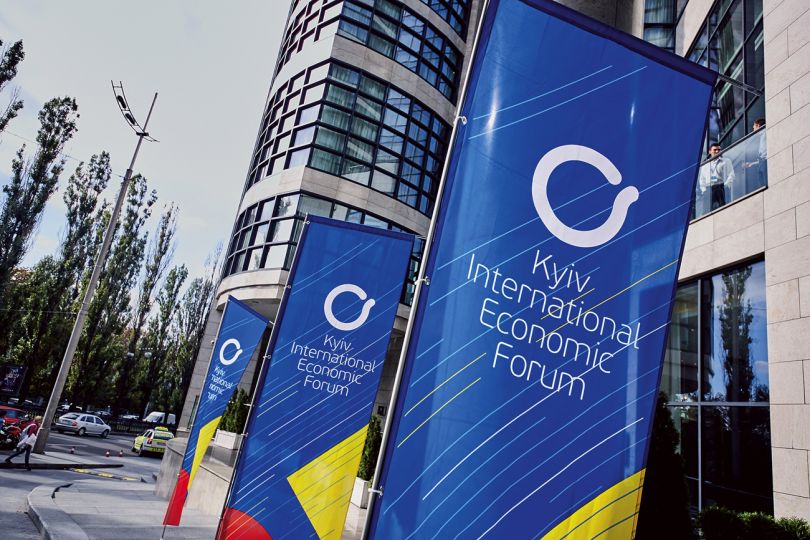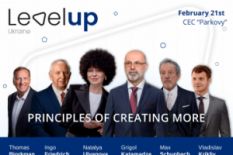The KIEF is the leading platform where new ideas, opportunities and solutions are found. More than two thousand participants from thirty countries will get together in Kyiv to discuss the prospects and major challenges of development of the Ukrainian and global economy. We have discussed several most relevant issues with Yurii Pyvovarov, the Chairman of the Organizing Committee of Kyiv International Economic Forum and the Executive Director of the Ukrainian Association for Innovation Development.
– This year, the theme of the KIEF is Creating the Future in a Changing World. To your mind, what must define the road map for Ukraine?
To start with, Ukraine must understand where the world is heading. The global economic development trends have recently been changing dramatically. Ten years ago, there was a globalisation tendency while there is an opposite vector now: the countries emphasise their national economy, own production, protection of the domestic market and creation of workplaces inside. It results in considerable transformation of the global economic landscape, which is proven not only by the trade war between the US and China, but also Brexit in Europe.
Another trend to be discussed at the Forum is vigorous growth of the developing countries. According to some economists’ estimates, the aggregate GDP of seven developing countries will have exceeded the aggregate GDP of G7, seven highly-developed world countries, by 2050. Such countries as Indonesia, Vietnam and Nigeria, to name a few, which are the markets we have paid no attention to, are turning into leaders by the scope of investment and development rates. Ukraine’s priorities of the foreign economic activity have been the American and European markets, but China is going to rank first in top three global economy leaders in ten years, followed by India, while the US will hold the third place.
Ukraine has already been integrated into the global economy: it exports and imports a lot, so it must respond to changes in a timely manner. Business must become aware of that. The politicians must understand what influence tools should be used as the economy cannot develop on its own. Unfortunately, the theory that the market will achieve the necessary balance on its own, without the government’s interference with the economy, is erroneous. The government itself must steer the national economy and stimulate certain areas of growth. Thus, each European country has the Smart Specialization Strategy (SSS), which sets certain national priorities and allocates corresponding resources for development thereof. We do hope that the priorities will also be set after the government has changed in Ukraine. Now all we hear is the great significance of the agrarian and IT industries, which is definitely not enough. Given the development of agricultural technologies, our agroindustry might employ several millions of people. The IT is capable of creating several hundreds of thousands workplaces at most. Thus, the economy’s focus must not be so narrow: there should be more priority industries in the country of more than 40 million people. These industries are going to be discussed at the Forum.

– What is Ukraine’s place on the global economic map, and how can it be improved?
First of all, the KIEF demonstrates the Ukrainian business the opportunities beyond the domestic market and the nearest European market, which is large, capable of paying, but highly competitive. The Asian and African markets are developing much more actively today, and the ones who will be the first to cooperate with these countries will benefit.
Secondly, we show the government that the transparent laws of the game are not the only thing necessary to create the favourable business environment: the judicial system, equal opportunities and protection of title etc. are basic aspects. There must be more drivers encouraging investment into the Ukrainian economy as the competition is global. Our neighbour, Poland, is creating advantageous conditions for investors, such as free land plots, tax exemption for the first five or ten years, lending benefits, compensation for the export lending interest rates to its exporters: simple calculations prove that it is more profitable to invest into Poland than into Ukraine. We believe that Ukraine must not be the country of cheap work force, which attracts investors today; this is wrong. Just like hundreds of the businessmen we expect to see at the Forum, we are interested in the economic programme of the new government, which still has not been made public. Mere deregulation is not enough, it cannot be the national strategy: we must see clear priorities, tools, institutions, and funds.
– Is the KIEF ready to facilitate establishment of the efficient dialogue between the government and the business community for this purpose?
We have already started collaboration with the new Cabinet. They are open to the dialogue, so the main thing is to move from slogans to specific proposals; we need the clear programme for future actions. The global community has a great interest in Ukraine now: the president, the parliament and the new government have been given a vote of confidence, all the power, all the tools and competence, but the priorities for 2020 must be stated.
– Innovation is the main success factor of the countries and the business community all over the world. What does it take to establish the innovation ecosystem in Ukraine? Where can we find the resources for R&D?
No matter how trivial it may sound, all elements of the innovation ecosystem need to be developed so that the system in general will be established in Ukraine. The first element is training: we need the contemporary educational system producing entrepreneurs and innovators. Not only programmers, but also IT entrepreneurs, biotechnology, nanotechnology, financial technical professionals and others. The next element is innovation parks with incubators and accelerators. Startups need assistance in commercialisation of their ideas since there is a huge gap between the idea and business. Let’s go on: who is the customer? In most cases, innovative solutions are ordered by large corporations offering a challenge to the startup community. It is done this way all over the world: innovations are generally born outside large companies. There are several corporate incubators, for instance, Radar Tech, Agro Tech, which develop startups in the agrarian, telecommunication, Fintech and other industries. Then goes money. Venture funds finance startups with the finished business model that is already running and invest into business scale-up while startups need business angels at the idea stage. Unfortunately, no country has such a high concentration of angel investment as in Silicon Valley. Anyway, the funds ready to finance talented teams that will generate ideas are now being established in Europe. To sum up, the state acts as a catalyst in the ecosystem. The state must develop the education, create the favourable business environment for corporations, and provide grants. For instance, in Israel, there is the Innovation Authority that annually grants 400 million US dollars to startups at different stages because business is not ready to assume such risks.

At the Forum, we will discuss development of the national innovation potential with the representatives of each element of the ecosystem, including educational establishments, the business community and the government.
– Ukraine is often said to be an agrarian and metallurgic country. Do we have a chance to develop other industries?
In fact, we mostly export agrarian and metallurgic products, which needs to be changed dramatically. However, we should understand that strategies in different industries cannot be the same. Machine building does not have to be production of motor vehicles only. A good example is success of Tribo Plant in Bila Tserkva, which manufactures brake pads; they are supplied to Volkswagen conveyor and used by high-speed Eurostar trains in Europe. It means we can be integrated into the supply chains with certain spare parts. We have everything to produce our own agricultural equipment instead of buying foreign one. The same can be said about the railways: a car can be 100 % Ukrainian, from the ore to the paint. The state-guaranteed order by the Ukrainian Railways will provide for the multiplication factor, owing to which additional work places will be created and companies will develop at all the production stages, from the ore to the paint. Ukroboronprom has great prospects if this non-public state-owned entity opens its doors to small and medium-sized business suppliers of certain spare parts and machines. The high-accuracy air and space machine building has a very high potential as Elon Musk’s space ships use Ukrainian engines. This industry keeps developing in Dnipro now, and expected space commercialisation will give it access to the global market. Thus, according to the business community’s estimates, commercial reclamation of the Moon, including production and delivery of mineral resources from there, will start next year.
– If these mechanisms are absolutely real, why are they still not in use in the country? Who or what must be a catalyst in this “chain reaction” to create the multiplication factor in the real economy?
A catalyst of such development is always the government, which must develop the priorities and focus resources. The experience of such Asian countries as Korea and China demonstrates efficiency of clear financial tools. When the government intends to develop a certain industry, it gives it specific preferences in order to raise business investment. It is public-private partnership where the government, on the one hand, acts as a co-investing partner and, on the other hand, guarantees certain laws of the game, profit and long-term prospects for the private investor.
– Ukraine is one of the European leaders in terms of transfers from abroad. According to the World Bank’s estimates, in 2018, Ukrainians transferred 14 billion US dollars or 11.4 % of the total Ukrainian GDP from abroad. The economic phenomenon of the Ukrainian labour migration is quite ambiguous. 3.2 million Ukrainians work abroad on a permanent basis, and 7 to 9 million are there temporarily. How can they be brought back to Ukraine, and how should the other citizens be prevented from labour migration?
Of course, it is a national issue. The business community often emphasises lack of work force. If Ukrainians work in Europe, people from Asia and Africa will come here. The big question is whether we are ready for such mass migration. Competitive and decent wages are the only thing that can make people return home. So it is economy again: we need to develop enterprises and create work places. This task is common for the government and the business community. For instance, MHP announces its vacancies in Poland today; the agricultural holding advertises itself as an employer and encourages people to come back home.
– What does efficient use of the human capital take, and what is the state’s role in human capitalisation supposed to be?
We must understand the benefits of our human capital. First of all, it is education. However, requirements to the educational system, including secondary, higher, vocational and business one, change rapidly, so we start to get behind the rest of the world. We lack the entrepreneur education: students are not taught in the necessary scope how to develop and do business, how to become an entrepreneur, which is the most important occupation for development of the present-day economy. Introduction of high technologies results in changes in the labour market structure: some jobs will disappear, some will appear. Therefore, retraining is a relevant issue: both people and the educational system must be ready for retraining. At the same time, the cultural level must be improved. Creativity, the ability to keep studying, emotional intelligence, cross-cultural communication, teamwork skills, the skill of listening to the others and finding synergy... Soft skills are turning into a must have. It is very difficult to find an adequate solution on your own. As a rule, the best ideas are generated by the teams made of absolutely different people. Uniqueness, talent and competence are at the crossroads of different knowledge and skills. Who is the driver in there? Both the government and the business community.
– The experts emphasise the factors hindering foreign investment into the Ukrainian economy. How can we demonstrate that investment into Ukraine is profitable?
First of all, we must show the success stories of those companies that already work here. There are pretty many of them. For instance, the “green tariff” has encouraged considerable investment into the solar energy industry, and the foreign companies that have started their business in Ukraine in this industry are already considering other prospects. The next thing is development of the industrial production potential. We have highly-qualified specialists, proper technologies, favourable logistical location in Europe and interesting industries, which can work both for the domestic market and export. Plants are being built in several industrial parks in Ukraine. For instance, Head, the famous global company manufacturing sports equipment, has started construction of the plant to employ 1,000 people in Vinnytsia.

– Who should these success stories be told to? How? What communication channels should be used?
There are numerous communication channels. Such forums as the KIEF need to be organised so that foreign businessmen will have an opportunity to communicate with the ones already working here. Ukraine must be represented at all the major foreign forums, including the World Economic Forum in Davos, Expo2020 etc. Ukraine must be advertised not only as a country, but also as a window of opportunities. Ukrainian success stories of the world-famous international companies must be given as an example. Of course, the state must work with the media. For example, Kazakhstan has its annual BBC show, where not only business, but also culture, history and values are discussed to raise the interest in the country. Unfortunately, Ukraine is most often associated with the war and corruption in the global media. This message must be replaced with the Investment Destination. That is very important. The foreigners coming to the KIEF say that what they hear of Ukraine on TV and what they see with their own eyes are like black and white.
– Do you mean there must be the integral marketing strategy for positioning the Ukrainian brand, not only in the global business community?
Definitely. This issue will be discussed at the Forum. What is Ukraine? What makes us unique? How does the world see our country? What national idea will enable our country to succeed? The example of Israel is stunning: they said, “We are a Startup Nation, let’s run!” In fact, they are now the leading global Startup Nation. Could we be the Talent Nation? We must set the ambitious goal: Ukraine is a country of talents, and do our best to reach it. The government, the business community and the society can convey this message all over the world and develop it inside. The state must set ambitious goals!







